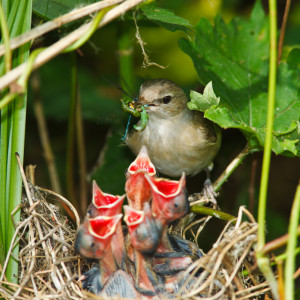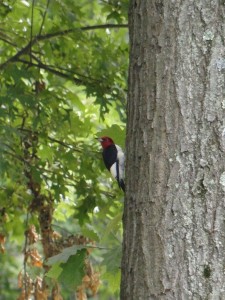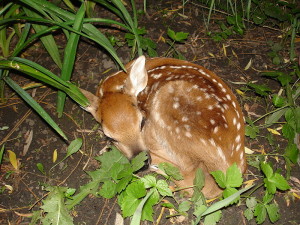WILDLIFE WEDNESDAY: Baby Birds
 With spring in full bloom, we have a number of bird species nesting in the MetroParks! With so many birds raising their new families, do you know what to do if you find a baby bird outside of its nest? Read on to learn more about MCMP’s new flying friends!
With spring in full bloom, we have a number of bird species nesting in the MetroParks! With so many birds raising their new families, do you know what to do if you find a baby bird outside of its nest? Read on to learn more about MCMP’s new flying friends!
BABY BIRDS IN MCMP: Today, I sat down with Kirsten Peetz, MCMP’s Natural Resources Manager, to learn about our songbird nesting season in MCMP.
ER: What does spring look like for the baby birds in the MetroParks?
KP: We have many songbird species actively nesting now. Generally, eggs are laid, then incubated for about two weeks. After hatching, the baby birds are in the nest for an additional two weeks or so. Eventually they will leave the nest, but their parents are still feeding, protecting, and taking care of them.
ER: Where are the most common places for songbirds to nest?
KP: Songbirds usually build their nests in trees, shrubs, and even tall grass, but others nest in birdhouses, buildings, and sometimes our pavilions. They are very protective over their nests because they are raising their babies, so you may find yourself being scolded or chased away by bird parents if you accidentally get too close to a nest.
ER: What types of birds can visitors expect to see in MCMP this spring?
KP: There are hundreds of species of birds documented in MCMP, and many of them nest here. We have a lot of bluebirds, woodpeckers, swallows, ducks, geese, and even wild turkeys nesting in the MetroParks!
ER: What should visitors do if they find a baby bird outside of its nest?
KP: It’s natural for us to assume that a baby bird needs our help if they are out of their nest. Sometimes they do need our help (for example, if they are injured or are too young to be out of the nest), however leaving the nest before they can really fly is part of their natural development. Usually the best thing is to leave the baby bird where it is, since their parents are still taking care of them, even if they’re on the ground. The babies know how to seek cover and will soon learn how to fly.
 MYTHBUSTER: Contrary to common belief, birds will return to their babies and nest even if it’s touched by a human. Birds actually have a very poor sense of smell!
MYTHBUSTER: Contrary to common belief, birds will return to their babies and nest even if it’s touched by a human. Birds actually have a very poor sense of smell!
However, it is very important to realize that leaving the nest is part of growing up for baby birds, and as MetroParks’ visitors we need to allow them to develop naturally. For detailed information on how to evaluate the situation if you come across a baby bird, visit the Cornell Lab of Ornithology.
ER: What is your favorite bird during the spring in MCMP?
KP: It’s so hard to pick just one! I do love seeing barn swallows, which are commonly nesting in barns and buildings throughout the MetroParks. They are aerial acrobats, like tiny fighter jets!
ER: Any final thoughts?
KP: I encourage people to watch and listen for the amazing bird life here in the MetroParks!
Upcoming birding opportunities during May in the MetroParks:
Birding the Sanctuary
Mill Creek MetroParks Sanctuary
5/17 8-9:30 a.m.
Search for birds with Jeff Harvey of Wild Birds Unlimited. Boots required. Register at FNC by 5/16
Bluebirds
Meet at MetroParks Farm
5/25 2-4 p.m.
Hike along Bluebird Trail to check nest boxes and learn about these beautiful birds. Moderate, 1.5 or 2.5 mi.
For more information on bird related events or any event in MCMP, visit us at MillCreekMetroParks.org!
[fbcomments]

